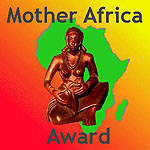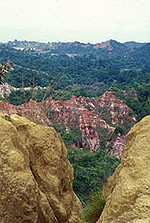
|
|
CONGO

|
|
|
|

|
|
|
Official Name
|
Congo
|
|
Located
|
Mid West: Zaïre, Gabon, Angola
|
|
Capital
|
Brazzaville
|
|
Head of State |
President Denis Sassou Nguesso
|
|
Area
|
342,000 sq km
|
|
Population
|
2.7 million
|
|
Growth rate
|
3%
|
|
Languages
|
French, Lingala, KiKongo & Monokutuba
|
|
Currency
|
Central African CFA francs
|
|
GNP per capita
|
$2,050
|
|
Inflation
|
5%
|
Airlines
(advertise here)
|
from Europe: ________________
from Asia: ________________
from USA: ________________
|
Hotels
(advertise here)
|
Names & Rates per night
______________________
______________________
|
|
USAfrica Agent
|
______________________
|
|
Country Advertiser
|
If you want to become
the Country Advertiser
your logo comes here.
|
|

Brazzaville
©2002: Africa Focus
|
|
|
In Congo everybody usually finds something to like; clean beaches and dancing to the music of some of Africa’s most popular recording stars. The country has huge oil reserves, which are being developed.
|
Economy:
|
Crude oil production and state-led development policies have acutely impacted Congo's economy. An urbanized service economy has developed while the agricultural sector has remained marginal. This structure evolved over a generation when the formal economy was largely run by the state and private enterprises were discouraged. This system was propped by external assistance, and by proceeds from oil sales which remained high until the mid-1980's. Relatively high spending and high salaries in the public sector, combined with poorly performing state plantations, produced a high degree of rural exodus to Brazzaville, the political capital, and to Pointe Noire, the economic center.
|
|

South Pointe Noire
©2002: Africa Focus
|
|
History:
Congo was a French colony from 1891 and became independent in 1960. Political conflict and civil disturbances in the Republic of Congo date back to the years preceding independence. Congo's history since independence has been violent, with three Presidential coups and one Presidential assassination from 1958 to 1979. By 1963, following the overthrow of the country's first President, Mr. Fulbert Youlou, the country was steeped in violence. In 1968, a military government came to power and subsequently proclaimed itself Marxist-Leninist in December 1969. Military rule continued to be punctuated by violent conflict in the form of attempted coups d'état and strikes. In 1979, Colonel Denis Sassou-Nguesso assumed power as president. In 1990, the government initiated a demobilization process, legalized opposition political parties, and abandoned Marxism-Leninism. President Lissouba was elected and took office in 1992. Since October 1997, President Sassou-Nguesso reassumed power, following a violent civil war between his forces, and forces loyal to then President Lissouba and former Prime-Minister Kolelas. The armed strife was violent and resulted in thousands of casualties, important population displacements, and widespread destruction. After restoration of a fragile peace in October 1997, a new cycle of violence suddenly resurged in December 1998. Since then, the transition to full democracy, and to a market-based economic system, has been undermined by frequent episodes of violence, insecurity and sporadic fighting.
Enabling us to improve the quality of the content, if you have additonal information, remarks or suggestions, please share it with us by e-mail.
Last update: 24 April 2008
|











